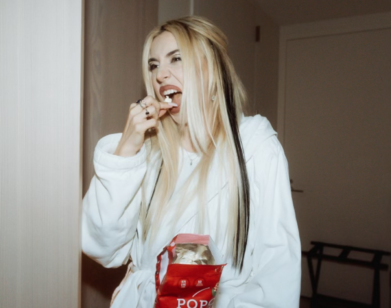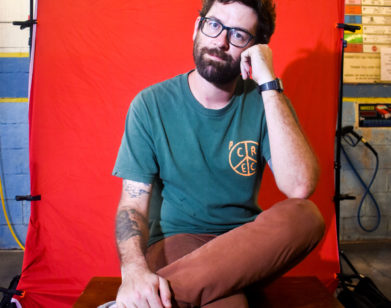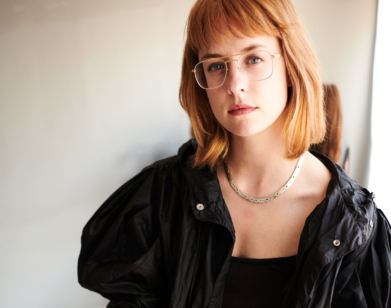in our feelings
Conor Oberst on Learning How to Say Goodbye
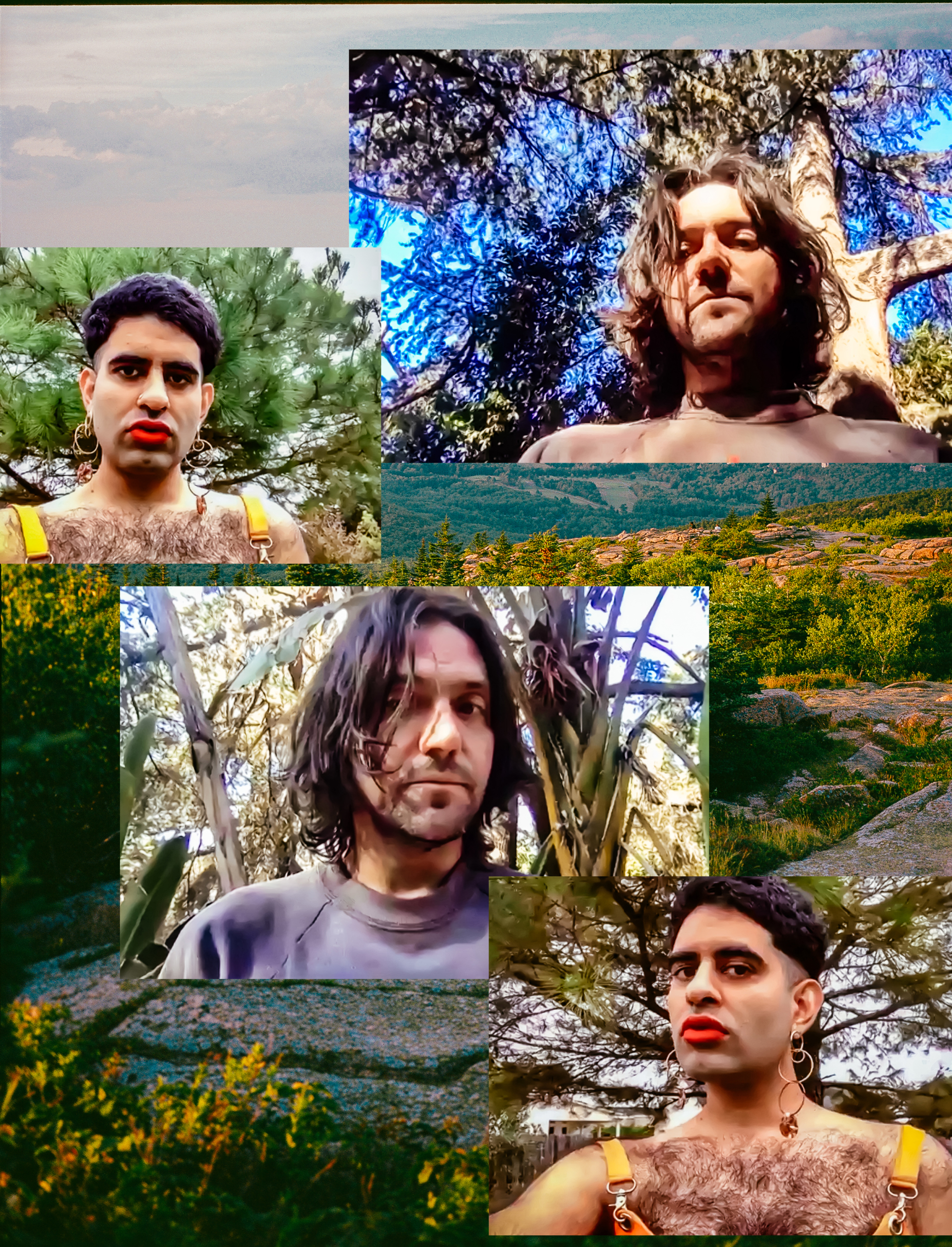 Before selfie cameras, we used to take photos with the flash on in front of the bathroom mirror. That, or we’d hold the digital camera like we were slow dancing with it. Our arms always made it into the frame, no matter how hard we tried. We didn’t quite understand how the internet worked yet, but we knew one thing for sure: we wanted to be seen.
Before selfie cameras, we used to take photos with the flash on in front of the bathroom mirror. That, or we’d hold the digital camera like we were slow dancing with it. Our arms always made it into the frame, no matter how hard we tried. We didn’t quite understand how the internet worked yet, but we knew one thing for sure: we wanted to be seen.
These were the days of trying. With our skinny jeans and AOL away messages, we tried to communicate the disconnect between what was promised and what was delivered. We had so much to say, but we didn’t know how. So we reproduced our favorite song lyrics, in albeit regrettable fonts. James Baldwin has this quote: “You think your pain and your heartbreak are unprecedented in the history of the world, but then you read.” I’d like to think that’s what art is about: making people feel less lonely. Like our deepest hesitations, they are real because they are felt by others.
I listened to my first Bright Eyes song when I was thirteen, in the cavernous darkness of my bedroom. The melodrama was part of the aesthetic. The angst was the point. I was part of the Xanga to Myspace migration of 2004. We were all talking to strangers online we called best friends. Because they were. We were all disaffected by something.
This is before I had the language of racism and transphobia to diagnose my alienation. I didn’t know who I was or what I wanted. But in his uncouth voice, I discovered my own. It was less about what he sang, and more about how sang it. Like if there are people out there who are honest about how much it hurts to be alive, then maybe it’s worth it, being alive. That maybe the pain is not the problem. The problem is feeling it alone.
My girlfriend and I used to turn on Bright Eyes for night drives on those endless Texan highways. We created cinema in the doldrum of the suburbs. We dreamed about somewhere far away from here. I promised myself that I would make it out alive so that I could tell him one day what he meant to me.
The first Bright Eyes album in nearly a decade, Down in the Weeds, Where the World Once Was, came out under quarantine. I listened to it there in the darkness, just like I used to. And I remembered the purpose of art. To connect us even when we can’t come together. To remember what it feels like to be alive.
Today I am meeting my childhood rock star. His name is Conor Oberst.
———
ALOK: I read an article about how some people in Oregon wouldn’t evacuate from the wildfires because they were afraid of “leftist looters.” It was such a metaphor for the American condition. This fire was coming to eviscerate them, but they weren’t afraid of that. They were afraid of some hypothetical thing. Poetry is the only place I can reckon with all of this—how hurt we are, and what that makes us do.
CONOR OBERST: It’s easier to fear a fantasy in your mind sometimes than it is to fear something concrete that’s right in front of you.
ALOK: Trauma makes it impossible for us to be in the present. We’re either anxious about the future or fixed on the past. Healing from trauma looks like embracing the chaos of the now. That’s what gravitated me to your work: your distinctive voice, which refuses to be contained by genre or convention. I read that you were in choir when you were a kid. What did your choir teachers think of your voice?
OBERST: I was one of those kids that was probably more mouthing than singing. When I was about 12-years-old I started playing guitar. I was pretty lucky because my dad played guitar, and my oldest brother did as well. They just showed me simple chords. I immediately wanted to put words to it and write songs. Even before that, I would write poems, and I can remember being in fourth grade we had creative writing class, and you had to write a poem. I remember my teacher was impressed, but also like, “What’s up with this kid?”
ALOK: You put out your first mix tape Water, in 1993, when you were only thirteen. What gave you the conviction to put out your voice in that way at such a young age?
OBERST: My older brother’s band would practice in our basement. Then my middle brother, Justin, we would go hang out at the record store and go to local shows. He saved up his money from mowing lawns, and I made the little four track recording, and he was like, “We should make a tape.” Because at that time, that was kind of what you did as a local band. You made the tape, and then you sold it for three dollars at one of the cool record stores. This older group of friends were already playing in bands, and eventually that group of people were the ones that started Saddle Creek, our first label.
We were lucky to have this one record store called the Antiquarian. They always were trying to give you an education about jazz music and old music. It was an epicenter if you were left of the dial, they’d hang the fliers for the local shows, so we were indoctrinated at a pretty young age. I feel really fortunate to kind of have had that in my town because that was pre-internet.
ALOK: A lot of that moment in the ’90s was so anti-establishment.
OBERST: Totally. Our heroes were Fugazi and Dischord Records, which was as anti-capitalist as you can be in the United States. We were going to see Fugazi when I was 11, and they had a thing where they would never charge more than five dollars for a show. We kind of idolized them. There’s a lot of stuff from the ’90s, like Bikini Kill and Kathleen Hanna. Just the idea of indie labels and doing it yourself. For us it was a reality because no one was going to come through Omaha and sign a band. So if we wanted to play music we realized pretty fast that we had to all chip in. You get a shitty van and you start driving around and sleeping on people’s floors. I had very supportive parents that let me start touring when I was 15-years-old. When I think back, I’m like, “Mom, Dad, what were you thinking?”
ALOK: How did you feel about being labeled an emo icon in the early 2000s?
OBERST: I remember the first time I ever heard the term. My high school band put out a couple records and played in Los Angeles because we had some friends that were in these punk bands out here. I remember a kid coming up to me after the show and saying, “you all should play at X… That’s where all the emo bands play.” I was like, “The what bands?” This is probably 1996 or something. Then after that, it obviously became a thing, but I associated that term with whiny type guitar with someone singing really long notes, and holding out the thing. I always say, “Isn’t emotion a fundamental ingredient in almost all music?”
ALOK: You were publicly expressing pain. I think, especially for men, you’re not supposed to feel. You’re just supposed to work or dominate. That dynamic creates this dichotomy between hyper-masculinity and hyper-sensitivity; there’s no range. You guys got flung into emo because you weren’t compromising your heart. Was it ever a question for you about how much pain you were willing to reveal through your music?
OBERST: That’s just how I expressed myself in my songs. It wasn’t until much later and getting in front of more people that I started to realize that maybe it was a little unusual. Everyone called our early Bright Eyes records melodramatic. It is. It was. But I was also an adolescent. That’s what I was living.
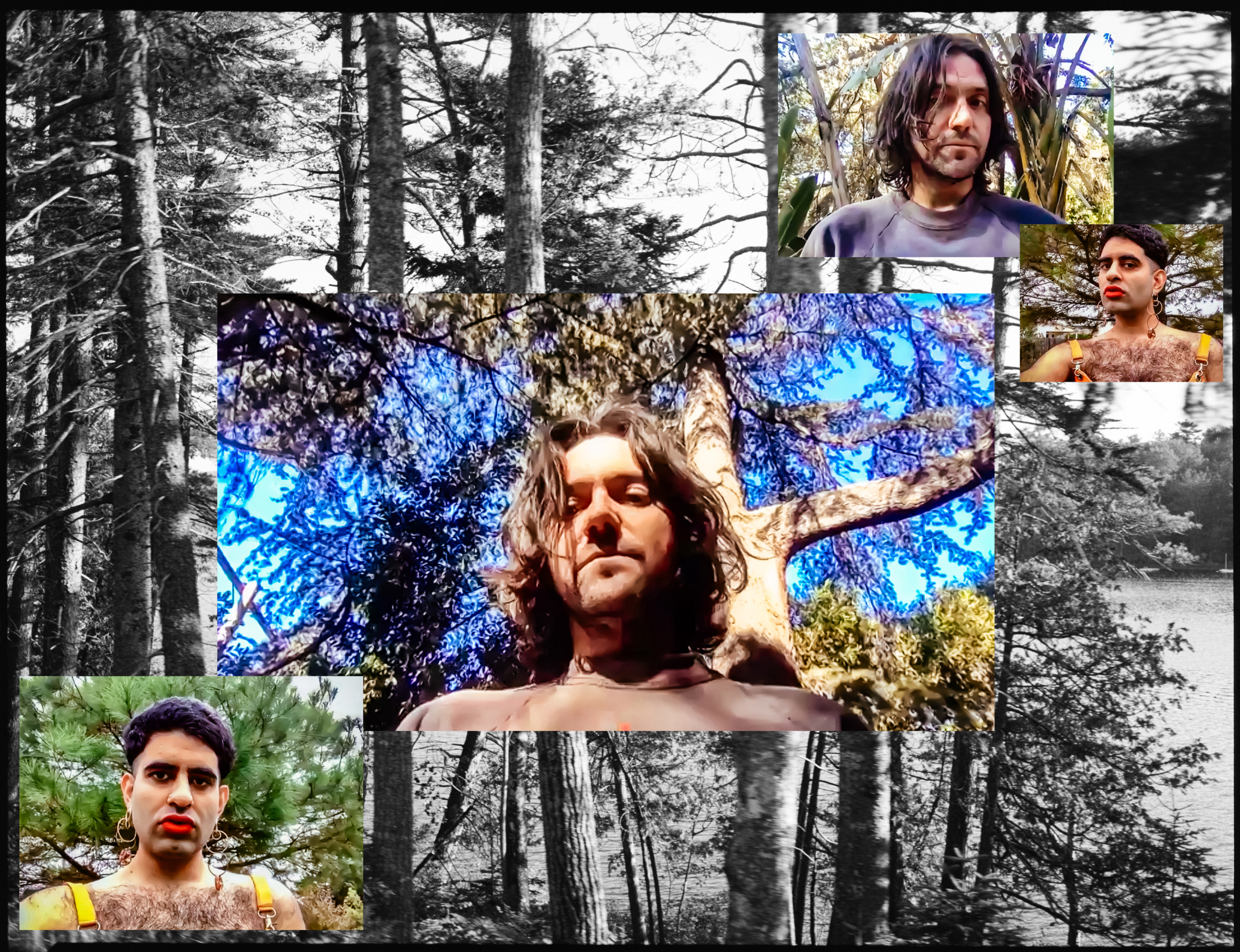
ALOK: I take performance really seriously because I’m trying to create a hole in the world where the rules from outside don’t matter, and here we’re vulnerable, we’re loving, we’re dreaming. It’s not just that we’re critiquing the world, it’s that we’re creating another world. How do you manage going from the kind of world you’re creating onstage to having to live in a world in which people can be emotionally numb?
OBERST: When you’re doing your show, you’re controlling the environment, and the people that come are joining you in your sort of reality. Obviously that’s not how the real world works. It can be a rude awakening. You begin to see these same things happening in your friends’ lives or your family’s lives, and it’s like, I don’t know. It just drives me crazy. I want to break out of this circular thing that humanity is, but it’s almost impossible to really make fundamental change. That’s why I appreciate what you do, because I feel like you’re trying to make a real change.
ALOK: You can have all the data, the facts, the history, but people won’t receive it because they’re committed to a world of mythological flames versus material flames. But I think the role that we have as artists is to suspend the rules of the normative world and show people that there’s another way to live, through feeling. It’s not just another way to think, it’s another way to live. How did you deal with your rise to fame?
OBERST: It’s definitely a mind fuck when you start experiencing that for the first time. There was a lot of questioning of myself and motives. Part of it was just getting over some kind of militant kind of punk rocker mentality and just being like, there’s a way to do this, and there’s people that do it right, and there’s people that maintain their integrity.
I guess my inherent personality has kind of helped me. I’ve never been on social media. All our social media is run by the management. Even back then, I never had a Facebook or a MySpace or any of that. I was very fortunate because I think if I had been more embedded in that culture or that world, it would have been more difficult.
ALOK: So many of your songs you take on a different character. When you’re writing, do you differentiate between writing stories about yourself and stories that just need to be told?
OBERST: I have always considered the purpose of songs is to find some sort of universal truth. I feel like it’s heavily dependent on observations. So you observe the world, you watch movies, you read newspapers, whatever. You’re absorbing all this stuff about other humans all the time. Then my job as a writer is to have my little satchel ready, and to go collect the little diamonds as I find them, the little nuggets that stay in my mind. Those will eventually come out in a song.
Pronouns in my songs have never really mattered that much to me, whether I’m singing I or you or he or she or whatever. The crux of the lyric is not found in that. It’s found in the words that follow that. If you’re writing a good song, you shouldn’t need a persona. It should be powerful enough on its own that somebody could cover it and it would mean as much.
ALOK: I see so much loving detail in your work.
OBERST: I think anyone that’s had love and lost love, it’s like, your mind is not obsessed with the generalities. You might express, “My ex-boyfriend was a wonderful person. He was so generous.” But that’s not what you remember. You remember the littlest things. You remember the toothpaste on the counter, and you remember the fucking annoying little habit they had. Because those little things are what make a person a person.
ALOK: There’s so much yearning for a different world in your music, yearning for what was, yearning for a past love. It’s less about an object, and more about the act. A forever yearning. What does nostalgia mean to you?
OBERST: I think getting older, the one thing unfortunately you get good at is saying goodbye to stuff. You have to. So if you can’t get good at it, you got to get used to it. It’s terrible. It’s nothing anyone should want to get good at. But at this point I’ve lost so many people I’ve loved, and so many circumstances that I know I’m not going to get back. I think it’s okay to sort of investigate it for yourself. But at a certain point, you can’t live in that space all the time or else you’ll drive yourself crazy. You have to keep trudging along, even if it kind of sucks.
ALOK: Do you see music as part of your healing?
OBERST: Writing definitely provides clarity because I think that a lot of times I don’t know what I felt about something. I have kind of a scattered brain, and so when I’m able to write something down that at least makes sense for me, even if someone reads it and it feels stream of consciousness or surreal. To me it’s pretty concrete, even if the language doesn’t reflect that. If my goal was just happiness or just comfort, I probably wouldn’t write half the shit I write. I write because I need to understand it, not because it’s necessarily going to help me heal from it. You’ve got to kind of do it even if you end up drudging up things that you probably could have left in the past.
ALOK: In this recent album, what felt different about your approach to loss? On the other side, it felt like you were more resigned to it.
OBERST: I lost my brother coming up on four years in November, and it’s one of those things that I know is not going to go away. It’s every time I look at my mom, or she has a little wine and she starts getting weepy. It all floods back. Of course I miss my brother. But the things that are hard for me at this point are the way that that loss is reflected in other people that I love. My mom, my dad, my other brother, his two kids. Trying to do whatever I can for them. But you can’t make these things right. That’s never going to go away. I think one of our best mechanisms to deal with loss is to have community and go through it together.
ALOK: That’s why I feel that this album is resonating—because we can’t grieve together right now. In this moment, music takes on a different kind of urgency. I’ve always read what you were doing as political because you’re actually saying, “Don’t desensitize yourself to what’s going on,” and for me the violence of this pandemic is people have not allowed themselves to feel their own pain, so when they see others in pain, they’re like, “Oh, that’s not real.” The core of everything happening in politics right now is fear. There’s so much fear right now: the future of the world, the rise of fascism, the loss of live arts.
OBERST: It really does feel apocalyptic. I mean, people overuse that word, but it’s been the scariest time in my life that I can think of. It’s global, it’s invisible. It doesn’t have any sort of shape. It’s also laying bare all these inequities that we all have known have existed for a long time.
But I guess my hope is that there’s more reasonable, thoughtful people in this world than there are just self-interested, bigoted people. I hope that’s true. I think that’s true, actually. I believe that to be true. I can’t give you facts and figures. I can’t prove it in any kind of definitive way, but I believe that to be true. I see examples of love and kindness in the world all the time. If there’s any kind of healing or a way out of this, it’s going to be that. The infrastructure’s there to make really substantial change, but they’re not going to give it to us. We got to fucking get out there and really work and really demand it. That’s the only way change has ever happened in this country.
ALOK: People have numbed themselves to their own humanity and the humanity of other people. That allows them to dismiss 200,000 dead people as nobodies. We need to reenergize our ability to feel.
OBERST: Most violence and most despicable behavior in the world is learned. We have to try to help people that are susceptible to that kind of hateful education. Obviously the earlier you can get to them, the better. But even people older in life—if you see somebody that’s being a misogynist or transphobic or racist, homophobic, whatever, even if you think it’s a joke, say something to them. Don’t be a bystander.

